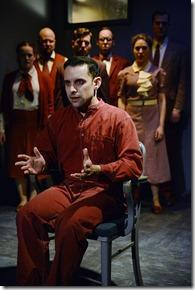
Hauptmann
Written by John Logan
Directed by Stephen M. Genovese
at Heartland Studio, 7016 N. Glenwood (map)
thru April 21 | tickets: $20 | more info
Check for half-price tickets
Read entire review
Early John Logan work challenges us to think about rights of accused

BoHo Theatre Ensemble presents
Hauptmann
Review by John Olson
Some 17 years ago, a young Chicago playwright and a small storefront theater company got together to produce this original drama concerning the rights of the accused in America. The play was an examination of the arrest and trial of Bruno Richard Hauptmann, who was charged with the 1932 kidnapping and murder of Charles Lindbergh’s 20-month-old son. Since 1986, things have gotten much better for the playwright: John Logan is now a true A-list Hollywood screenwriter with three Oscar nominations and the screenplays for films including “Gladiator”, “The Aviator”, “Sweeney Todd” and “Hugo” to his credit, not to mention a Tony Award for Red. Logan’s star in the
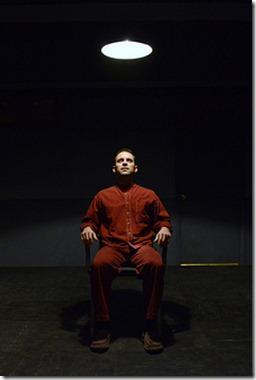
Hauptmann, a German immigrant with a shady past back in his homeland, was ultimately convicted and executed for the crimes with which he was charged. The conviction was based on circumstantial evidence – there were no witnesses – and much of it has been challenged in the decades since, though there are many who believe Hauptmann was in fact guilty. Hauptmann the play leans more to the side of Hauptmann the person, who narrates the action some time after his conviction and sentencing but before his execution. His arrest, detention, interrogation and trial are all told from the accused’s point of view and even knowing that Logan withholds some facts that might support Hauptmann’s guilt, the point that the State of New Jersey had an unfair advantage against the defendant is convincingly made. As the character tells us, this was a case the authorities couldn’t afford to lose. Lindbergh was a national hero for his feat of flying solo across the Atlantic. If they couldn’t find justice for this crime, what could they do right? The system would be seen as incompetent if they failed to win a conviction. To be sure they’d win, the state spent millions preparing and trying their case – many times more than what Hauptmann could afford. His lawyer was hired by the Hearst Newspaper chain, whose interest was not in protecting Hauptmann but in securing inside information on the case that they could use in their news reporting.
Director Stephen M. Genovese and his lead actor Jeremy Trager take pains to balance the debate out more than Logan does, by giving us an ambiguous and none-too likable Hauptmann. Trager makes the accused generally cocky – much of the time seemingly amused at the ineptitude and outrageousness of the police, the prosecution and the judge. In flashback scenes, though, Trager shows Hauptmann’s terror amidst his badgering in the interrogation room and on the witness stand and as he gets closer to his death, he becomes truly terrified. It’s an intense and layered performance – and a big step forward in the career of this young actor who we’ve seen mostly in musicals up and down the avenues Glenwood (for BoHo and Theo Ubique) and Belmont (Porchlight, et. al). It’s not entirely Trager’s show, though – he’s supported by a strong supporting cast, with particularly noteworthy character work from Nathan Randall as the prosecuting attorney and Nathan Grant in a number of roles.
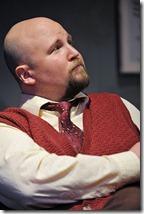 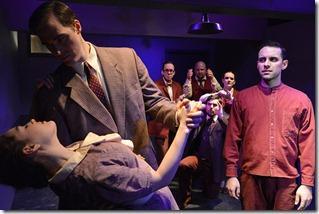
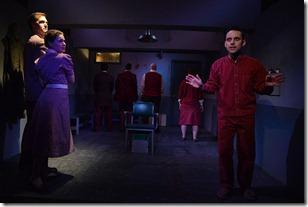 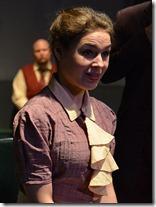 |
The tiny space of the BoHo Heartland Studio is perfectly claustrophobic, especially with John Zuiker’s set of a grim interrogation room. The deliberately harsh lighting by Diane D. Fairchild and associate designer Megan Turnquist adds to the tension.
What’s problematic about the piece, though, is that its thesis is fairly obvious from the beginning and hence there’s not much of an arc in this early script by Logan. The first act is quite talky – relying a great deal on Hauptmann’s monologues as he relays some fairly technical details on the evidence against him. There’s more interaction between the characters as we move into the trial in Act Two. This, and Hauptmann’s increasing terror make the piece more intriguing.
Logan takes shots at the national news media of the era – and suggests they have some culpability in presuming Hauptmann’s guilt. The idea that an accused person is probably a guilty person is one that, in Logan’s view, must be challenged. As with so many ideas of social justice, a special opportunity and responsibility to promote truth and fairness falls on journalists – and artists like Logan.
Rating: ★★★
Hauptmann continues through April 21st at Heartland Studio, 7016 N. Glenwood (map), with performances Thursdays-Saturdays at 8pm, Sundays 2pm. Tickets are $20, and are available by phone (866-811-4111) or online through OvationTix.com (check for half-price tickets at Goldstar.com). More information at BoHoTheatre.com. (Running time: 2 hours, includes an intermission)
Photos by Peter Coombs
artists
cast
Jeremy Trager (Bruno Richard Hauptmann), Chris Amos (Charles Lindbergh), Sasha Kraichnan (Anne Lindbergh), Eleanor Katz (Anna Hauptmann), Nathan Randall (Wilentz), Nathan Grant (Dr. Condon), Derek Van Barham (Judge Trenchard).
behind the scenes
Stephen M. Genovese (director), John Zuiker (scenic design), Diane D. Fairchild (lighting design), Rachel Parent (costume design), Peter Robel (dialect coaching), Kaela Altman (producer), Cara Feeney (scenic painter), Nick Barsuli (stage manager), Meg Love (production manager), Megan Turnquist (associate lighting designer), Charles Riffenburg (graphic designer), Cassy Schillo (properties designer), Garrett Weeda (technical director), Peter Coombs (photos)
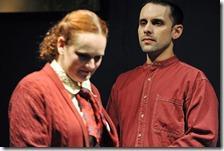
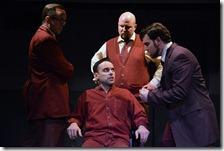
13-0355

